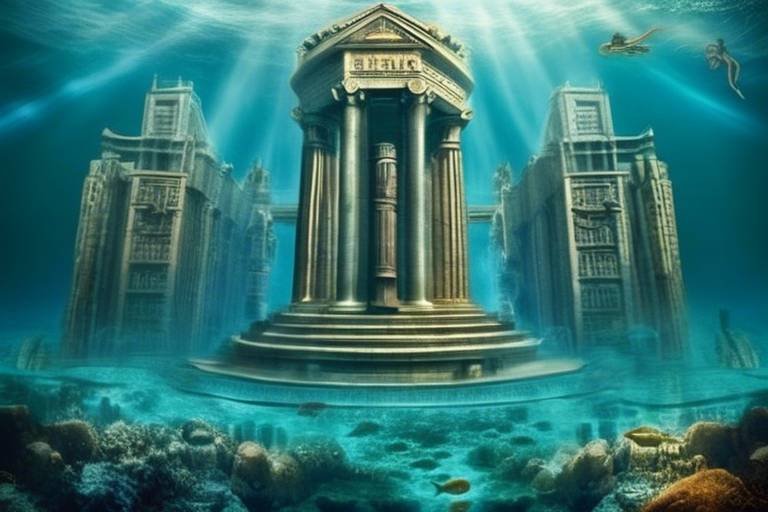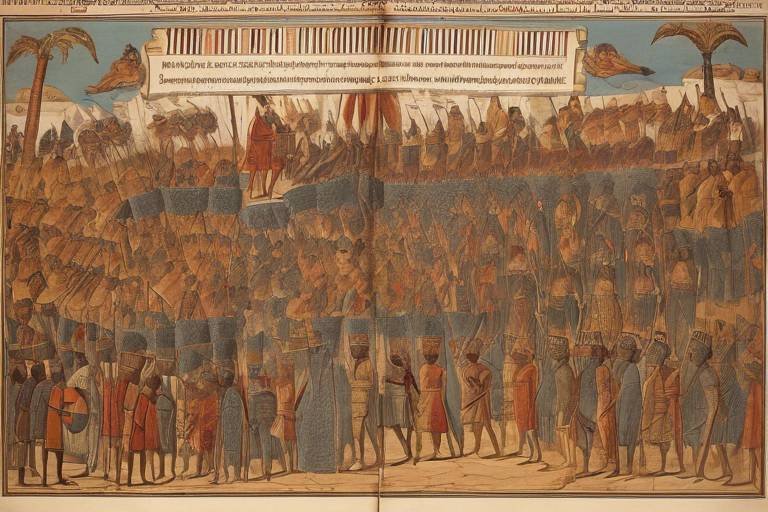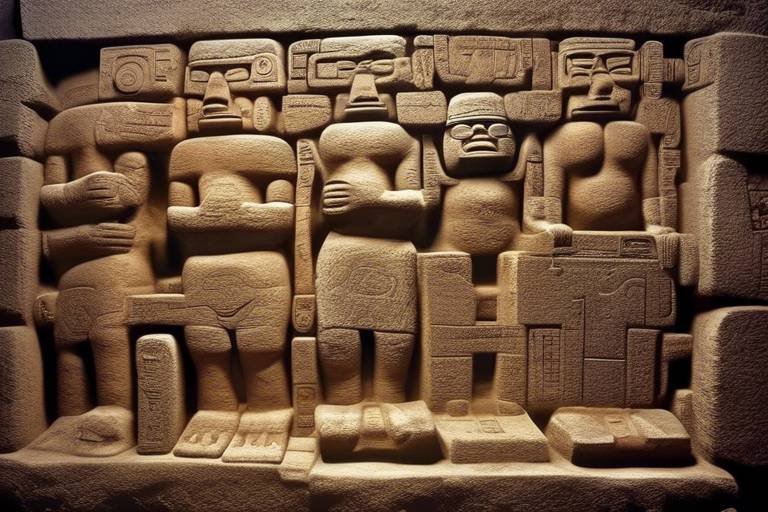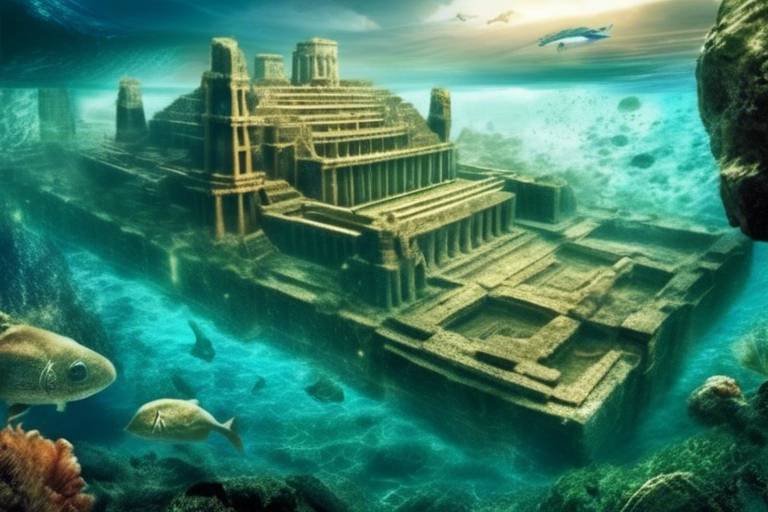The Mystery of Atlantis - Fact or Fiction?
Deep beneath the waves of the ocean lies a mystery that has captivated the minds of scholars, explorers, and dreamers for centuries - the enigmatic legend of Atlantis. Was Atlantis a real civilization lost to the depths of the sea, or merely a fictional creation born from the imagination of ancient storytellers?
As we delve into the depths of history and explore the various accounts and theories surrounding Atlantis, we are faced with a tantalizing question - is Atlantis fact or fiction? The answer remains elusive, shrouded in mystery and speculation.
From the vivid descriptions in Plato's dialogues to the tantalizing clues hidden in geological formations, the quest to uncover the truth about Atlantis continues to intrigue and fascinate. Could Atlantis have been an advanced civilization, possessing knowledge and technology far beyond our own? Or is it simply a cautionary tale, a mythical warning against the dangers of hubris and the perils of lost glory?
As we navigate the murky waters of myth and reality, one thing remains certain - the allure of Atlantis persists, beckoning us to explore its secrets and unravel its mysteries. Join us on a journey through time and legend as we seek to answer the age-old question: is Atlantis a fact or merely a figment of imagination?

Historical Accounts
Historical accounts of Atlantis have been a subject of fascination for centuries, with the legendary island civilization first mentioned in Plato's dialogues, particularly in the works "Timaeus" and "Critias." According to Plato, Atlantis was a powerful and advanced civilization that existed around 9,000 years before his time. The dialogues describe Atlantis as a large island located beyond the Pillars of Hercules, which many believe to be the Strait of Gibraltar.
Plato's detailed accounts of Atlantis have sparked debates among scholars, historians, and archaeologists regarding the authenticity of the civilization. Some view Atlantis as a purely fictional creation by Plato to convey philosophical concepts, while others argue that there could be a historical basis for the story. The lack of concrete archaeological evidence has fueled skepticism about the existence of Atlantis, leading to various interpretations of its significance.
Aside from Plato's writings, other ancient texts and historical records also make reference to a lost civilization that shares similarities with the Atlantis narrative. For instance, the ancient Egyptian story of the destruction of the island of Keftiu, the Minoan civilization on the island of Crete, and the accounts of the lost continent of Lemuria have been linked to the Atlantis myth.
Moreover, the Atlantis legend has transcended time and culture, appearing in the works of ancient Greek writers, medieval scholars, and Renaissance thinkers. The enduring mystery of Atlantis continues to captivate the imagination of people worldwide, inspiring countless interpretations, theories, and quests to uncover the truth behind this enigmatic civilization.

Geological Evidence
When delving into the mystery of Atlantis, one cannot ignore the intriguing geological evidence that some believe could point to the existence of this legendary civilization. Among the most discussed formations is the enigmatic Bimini Road, a submerged rock formation off the coast of the Bahamas. This underwater structure, consisting of rectangular limestone blocks, has sparked debates among researchers, with some suggesting it could be the remnants of a man-made construction, possibly linked to Atlantis.
Another geological feature often associated with Atlantis is the Richat Structure, also known as the "Eye of the Sahara" due to its circular shape resembling a bull's-eye. Located in Mauritania, this massive geological formation has led to speculation about its potential connection to Atlantis, with theories proposing it as the possible location of the lost civilization's capital city.
Furthermore, proponents of the Atlantis theory point to other underwater anomalies and geological formations around the world as potential evidence of a lost advanced civilization. These geological clues continue to fuel the debate surrounding Atlantis, adding layers of complexity to the enduring mystery.

Advanced Civilization
Delving into the intriguing concept of an that supposedly thrived on the mythical island of Atlantis opens up a realm of possibilities and speculations. According to various theories, Atlantis was not just any ordinary society but a highly developed culture with remarkable technological advancements and profound knowledge that surpassed the understanding of its contemporaries.
Imagine a civilization so advanced that it could manipulate the forces of nature, harness energy in ways unimaginable, and create structures of awe-inspiring grandeur. Proponents of the idea of an advanced Atlantis argue that this ancient society possessed scientific knowledge and capabilities far beyond what we currently comprehend, possibly influencing the course of history in ways we are only beginning to grasp.
Some theorists even suggest that the Atlanteans had mastered mystical arts and esoteric wisdom, delving into realms of consciousness and spirituality that remain enigmatic to this day. The notion of an advanced civilization like Atlantis challenges our conventional understanding of history and invites us to reconsider the possibilities of ancient achievements that may have been lost to time.

Lost City Theories
Lost City Theories surrounding Atlantis have sparked intense debate and speculation among researchers, historians, and enthusiasts alike. One prevalent theory suggests that Atlantis could be located in the Mediterranean Sea, near the island of Santorini, where a volcanic eruption in ancient times reshaped the landscape dramatically. This catastrophic event has been linked to the destruction of Atlantis in some accounts, adding a layer of geological evidence to the myth.
Another intriguing hypothesis places Atlantis in the Caribbean, specifically around the region of Cuba and the Bahamas. Proponents of this theory point to underwater formations and anomalies that resemble man-made structures, fueling the belief that a sophisticated civilization once thrived in the depths of the Atlantic Ocean. The discovery of submerged ruins and geometric patterns has only deepened the mystery surrounding Atlantis's potential existence in this area.
Some researchers have even proposed that Atlantis might have been located in Antarctica, supported by the presence of ancient maps depicting the continent before it was covered in ice. The idea of a lost civilization flourishing in a now-frozen landscape adds a chilling yet captivating dimension to the search for Atlantis, pushing the boundaries of conventional archaeological exploration.
Despite the diverse theories and speculations, the quest to unveil the truth behind Atlantis's enigmatic legacy continues to inspire expeditions and investigations worldwide. As researchers delve into ancient texts, analyze geological formations, and harness cutting-edge technology, the allure of Atlantis remains as potent as ever, beckoning explorers to uncover the secrets hidden beneath the waves.

Atlantis in Popular Culture
Atlantis, the legendary island civilization, has not only intrigued scholars and historians but has also captured the imagination of writers, filmmakers, and artists for centuries. The enigmatic tale of Atlantis has been a popular subject in various forms of popular culture, influencing literature, movies, and art in profound ways.
Writers and storytellers have often used Atlantis as a backdrop for their narratives, weaving tales of a lost utopia or a technologically advanced society that met a tragic end. Films and television shows have also delved into the mystery of Atlantis, portraying it as a mystical place shrouded in secrets and ancient wisdom.
Artists, both traditional and digital, have depicted Atlantis in their works, creating stunning visuals of a sunken city surrounded by water, showcasing the grandeur and mystery of this legendary civilization. The allure of Atlantis in popular culture lies in its potential for exploration, adventure, and discovery, offering a canvas for creativity and imagination to run wild.
Through various mediums, Atlantis continues to be a symbol of the unknown, sparking curiosity and fascination among audiences worldwide. Its presence in popular culture serves as a reminder of the enduring appeal of mysteries and the human quest for understanding the past and uncovering hidden truths.

Atlantis Symbolism
Atlantis, the legendary island civilization, holds a profound symbolic significance in various fields beyond its historical debate. This enigmatic land has become a metaphor for utopia, embodying the human pursuit of perfection and the ideal society. Just as Atlantis represents a paradise lost, it also serves as a cautionary tale against hubris and the consequences of overreaching ambition.
In philosophy, Atlantis symbolizes the unattainable ideal, a society of harmony and prosperity that exists only in the realm of imagination. Psychologically, the myth of Atlantis delves into the collective unconscious, reflecting humanity's innate desire for a better world and the eternal quest for knowledge and enlightenment.
Moreover, in esoteric traditions, Atlantis is often associated with hidden wisdom, mystical teachings, and spiritual enlightenment. It is seen as a sacred place of ancient knowledge that transcends time and space, offering insights into the mysteries of the universe and the human soul.
The symbolism of Atlantis extends beyond its literal existence, resonating with individuals seeking meaning and purpose in a world filled with uncertainties. As a symbol of both grandeur and downfall, Atlantis continues to captivate minds and inspire creative interpretations across different cultures and disciplines.

Mythical Aspects
When delving into the of Atlantis, one is transported to a realm where reality intertwines with legend, blurring the lines between fact and fiction. The story of Atlantis is not merely a historical account but a tapestry woven with threads of mysticism, intrigue, and wonder.
At the heart of the Atlantis myth lies the portrayal of an advanced civilization possessing knowledge and technology surpassing our own. The Atlanteans are often depicted as a highly evolved society, capable of feats that defy conventional understanding. Their mastery over nature, the enigmatic energy sources they purportedly harnessed, and their alleged communication with divine entities all contribute to the mystique surrounding Atlantis.
Central to the myth is the conflict with gods, a recurring motif in ancient narratives. The Atlanteans' defiance of divine will and their quest for power beyond mortal limits ultimately lead to their downfall. This theme of hubris and divine retribution resonates across cultures, serving as a cautionary tale about the dangers of unchecked ambition and pride.
The cataclysmic destruction of Atlantis is shrouded in mystery and speculation. Whether it was engulfed by the sea in a single cataclysmic event or gradually succumbed to internal strife and external pressures, the myth endures as a testament to the impermanence of even the most magnificent civilizations.
Exploring the mythical aspects of Atlantis unveils a narrative rich in symbolism and allegory, inviting us to ponder existential questions about the nature of humanity, the pursuit of knowledge, and the consequences of our actions. The legend of Atlantis transcends time and space, beckoning us to venture into the realm of imagination where reality and myth converge.

Modern Expeditions
Modern expeditions focused on uncovering the truth about Atlantis have utilized a combination of cutting-edge technology and interdisciplinary research. Underwater surveys conducted in regions speculated to be the possible location of Atlantis have revealed intriguing findings, sparking further interest and investigation. Satellite imaging has been employed to map underwater structures and geological formations, offering new perspectives on the search for the legendary civilization.
Archaeological teams have embarked on expeditions to key sites, meticulously documenting any potential evidence that could shed light on the existence of Atlantis. Through meticulous excavation and analysis, researchers aim to piece together the puzzle of this ancient mystery. Interdisciplinary studies involving experts from various fields, including geology, archaeology, and marine biology, collaborate to explore different facets of the Atlantis enigma.
Frequently Asked Questions
- Is Atlantis a real place?
Atlantis is a legendary island civilization that has captured the imagination of many, but its existence remains a topic of debate among scholars. While some believe it to be a real place that existed in the past, concrete evidence has yet to definitively prove its existence.
- Where is Atlantis believed to be located?
The location of Atlantis is a subject of speculation, with various theories placing it in different parts of the world, from the Mediterranean Sea to the Caribbean. However, no consensus has been reached on its exact location, adding to the mystery surrounding this enigmatic civilization.
- What evidence supports the existence of Atlantis?
There are different types of evidence that have been put forward to support the existence of Atlantis, including references in ancient texts, geological formations that some believe could be remnants of the lost civilization, and interpretations of historical accounts. However, the validity and interpretation of this evidence remain contentious.
- Has Atlantis influenced modern culture?
Absolutely! The myth of Atlantis has had a significant impact on modern culture, inspiring numerous works of literature, art, and film. Its themes of a lost, advanced civilization and the allure of a utopian society continue to fascinate and influence creative minds around the world.
- Are there ongoing efforts to find Atlantis?
Yes, there are ongoing expeditions and research efforts aimed at uncovering the truth behind the Atlantis legend. Modern technology, such as underwater surveys and satellite imaging, is being utilized to explore potential underwater sites that could provide clues to the existence of Atlantis.


















